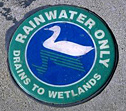UC IPM Makes It Happen
 IPM advisor promotes IPM practices in San Diego IPM advisor promotes IPM practices in San Diego
Many homeowners use too much pesticide and fertilizer that can end
up in our lakes, beaches, and bays when it rains or when they overwater.
To generate awareness about this issue, Project
Clean Water (www.projectcleanwater.org) was created
in July 2000 and offers people in the San Diego region a broad forum
to explore water quality issues.
The project is comprised of a policy
advisory committee with technical advisory committees for education,
watershed protection, and legislation
and regulation.
UC IPM Advisor Cheryl Wilen is working with the Healthy
Garden—Healthy
Home component of the project to educate San Diego County residents
about how to improve their water resources.
As part of this effort,
a team of 25 UCCE San
Diego County master gardeners has undergone
extensive IPM training to provide outreach
to the San
Diego community. Master gardeners offer IPM workshops on such
topics as irrigation,
lawn management, and plant selection. They also staff a master
gardener hotline to answer home gardening and pest management
questions. Other
components of this project include training of retail nursery
staff and participation in community events.
>>
Read
the complete article
 Pesticide use trends and educational strategies for urban pest managers Pesticide use trends and educational strategies for urban pest managers
Pesticide
contamination of urban creeks, estuaries, and other waterways is
an increasing concern in California. A recently released report
by UC IPM
scientists Cheryl Wilen and Mary Louise
Flint, along with IPM
graduate student Nila Kreidich,
looks at pesticide use trends and educational opportunities for
professionals who apply pesticides in urban areas and may contribute
to environmental
problems. The study complements earlier studies by Wilen and
Flint that investigated
pesticide
use and attitudes among California residents.
The study, funded by the California
Department of Pesticide Regulation (DPR), took a comprehensive
look at user groups in three California counties: Orange,
Sacramento, and San Diego. Groups studied included licensed
professional applicators, who must report pesticide use to DPR through
its
use reporting system, as well
as several other groups ranging from school employees, employees
of private businesses, and unlicensed gardeners, whose use
of pesticides is not
well documented.
Investigators found significant differences between pesticide
use in northern and southern California and also identified
shifts in types
of chemicals
used in recent years. Educational opportunities varied among
user
groups. While
licensed professionals have substantial educational resources
available, unlicensed users
of pesticides are difficult to reach. Outreach strategies
recommended include consumer education, innovative educational materials,
adoption of IPM policies,
point-of-purchase education, and IPM certification programs.
>>
Read
the complete article
|


